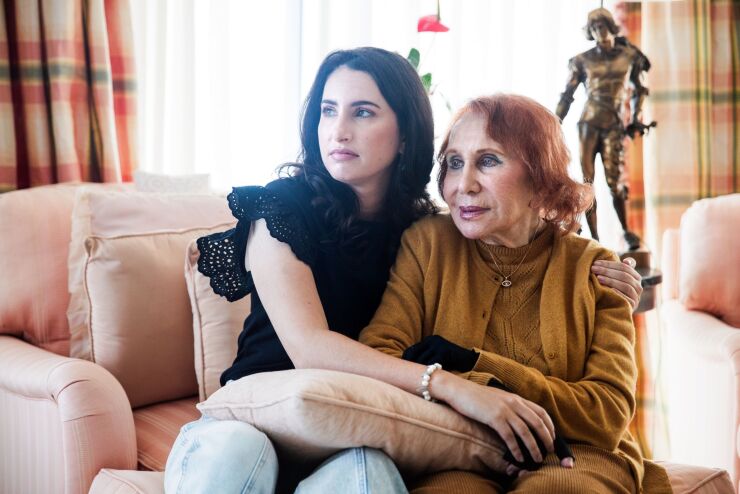
A wealthy Florida grandmother has intensified her legal
The grandsons, who are brothers, handled Beverley Schottenstein’s roughly $80 million account when they worked as brokers at the Wall Street bank. In recent months, they’ve been trying to force their 95-year-old grandmother into court-ordered talks to slash the amount of money that an industry arbitration panel ordered them last year to pay her.
But in a Feb. 24 ruling, a Florida judge said no dice to the grandsons’ effort, ordering that Schottenstein’s lawsuit against them proceed without court-driven mediation.
The high-profile case has highlighted the tangles that emerge when relatives manage a family member’s money. It has also cast a spotlight on the risk of financial advisors taking advantage of elderly or vulnerable clients and on a family of wealth, privilege and drama.
“This litigation is the stuff of soap operas, rom-coms and television mini-series,” wrote securities lawyer Bill Singer in a
Elder abuse
Schottenstein, a resident of the affluent enclave of Bal Harbour, Florida, is the matriarch of a retail empire that includes stakes in shoe seller DSW, clothing chain American Eagle Outfitters and American Signature Furniture. Her late husband and his brothers founded a business that became Schottenstein Stores Corp. and later grew to include stakes in clothing and furniture retailers as well as more than four dozen shopping centers, shoe and furniture factories and the grocery chain Albertson’s, among other holdings,
“I hope my cousins adhere to the judge's ruling and pay my grandmother what they owe her,” said
‘Bankrupt’
Schottenstein sued J.P. Morgan Securities and grandsons Evan Schottenstein and Avi Schottenstein in February 2021 to force them to pay her the collective $19 million that arbitrators at the Financial Industry Regulatory Authority, the self-regulating watchdog of the brokerage industry, awarded her just over a year ago. It is FINRA’s largest award to an investor in more than 2 ½ years. Schottenstein had accused the Wall Street bank and grandsons of making unauthorized trades in risky securities known as “auto-callable structured notes” and orchestrating secret investments that she didn’t approve of.
Schottenstein dropped J.P. Morgan Securities as a defendant in her lawsuit in federal district court in Miami on Feb. 24 because the bank has already paid her the $4.7 million FINRA ordered. The bank also unwound Schottenstein’s $4.3 million investment in a Coatue private equity fund and forked over nearly $173,000 for costs. Veronica Navarro, a spokeswoman for JPM, declined to comment.
Under the FINRA award, Evan Schottenstein, his grandmother’s lead advisor, owes her more than $9.3 million, plus half of the matriarch’s legal fees in the case. Brother Avi Schottenstein owes over $600,000. A FINRA panel in Boca Raton, Florida, held 43 sessions on Zoom for Schottenstein’s arbitration claim, which was filed in July 2019. Schottenstein contacted FINRA after a granddaughter, who was visiting in late 2018, used Schottenstein’s J.P. Morgan Securities credit card to log in to the matriarch’s account and saw “very alarming” trades, including one for $150 million in derivatives, court papers show.
Evan Schottenstein worked at J.P. Morgan Securities as a broker from 2014 to June 27, 2019, when he was discharged over “concerns relating to trading activity for the account of a family member,” according to
Schottenstein attempted last year to resolve her lawsuit seeking to enforce FINRA’s award by negotiating an out-of-court settlement with her grandsons. Last April, the two sides
Last January, the brothers filed a motion asking the judge to require court-supervised mediation of the dispute, arguing in legal papers that “a resolution of this case through mediation will save the court valuable time and resources.”
But on Jan. 28, a magistrate judge in the case issued a “report and recommendation” urging that the FINRA award be enforced and that the grandsons’ motion for court-ordered mediation be denied because their prior settlement talks with Schottenstein weren’t enforceable.
In a Feb. 20 order, Judge Beth Bloom of United States District Court for the Southern District of Florida denied the brothers’ mediation petition. Their grandmother, she wrote, “may, of course, settle the case outside of mediation and avoid Evan Schottenstein’s bankruptcy if she chooses to do so, and court-annexed mediation is not required for further settlement negotiations.” Peter Fruin, a lawyer for the grandsons in Birmingham, Alabama, said that “we’re disappointed” by the ruling. Scott Ilgenfritz, a lawyer for Beverley Schottenstein in Tampa, Florida, did not immediately respond to a request for comment.
‘Too many cooks in the kitchen’
In February, lawyers for the grandsons argued in a filing that “the biggest obstacle to settlement” was that Schottenstein “has too many cooks in the kitchen. Aside from four experienced litigators and an experienced tax counsel, Petitioner has multiple family members (at least one of whom has a law degree) advising her on what she should and should not agree to.”
In a Feb. 28 filing, lawyers for the two brothers argued that Evan Schottenstein could not afford his more than $9 million share of the award. The grandson, his lawyers said, “will likely have no choice but to declare bankruptcy” if forced to pay it, court papers show.
The filing also said that prior settlement talks with Schottenstein would have cut the brothers’ collective obligations to their grandmother by more than half, to $4 million. The talks broke down due to “stumbling blocks” on issues including confidentiality, non-disparagement and taxes, court papers said.
A recent profile of the Schottenstein family in “Columbus Monthly” magazine — the family has roots in Columbus, Ohio — quoted Cathy Schottenstein Pattap as referring to “the toxicity of inherited wealth” and the family’s “complicated history and dynamics.” The
Editor's note: This story has been corrected to reflect the first name of a spokeswoman for J.P. Morgan Securities. It is Veronica, not Jessica.







